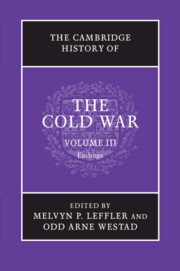Book contents
- Frontmatter
- 1 The Cold War and the intellectual history of the late twentieth century
- 2 The world economy and the Cold War, 1970–1990
- 3 The rise and fall of Eurocommunism
- 4 The Cold War and Jimmy Carter
- 5 Soviet foreign policy from détente to Gorbachev, 1975–1985
- 6 Islamism, the Iranian revolution, and the Soviet invasion of Afghanistan
- 7 The collapse of superpower détente, 1975–1980
- 8 Japan and the Cold War, 1960–1991
- 9 China and the Cold War after Mao
- 10 The Cold War in Central America, 1975–1991
- 11 The Cold War and southern Africa, 1976–1990
- 12 The Gorbachev revolution and the end of the Cold War
- 13 US foreign policy under Reagan and Bush
- 14 Western Europe and the end of the Cold War, 1979–1989
- 15 The East European revolutions of 1989
- 16 The unification of Germany, 1985–1991
- 17 The collapse of the Soviet Union, 1990–1991
- 18 Science, technology, and the Cold War
- 19 Transnational organizations and the Cold War
- 20 The biosphere and the Cold War
- 21 The Cold War and human rights
- 22 The Cold War in the longue durée: global migration, public health, and population control
- 23 Consumer capitalism and the end of the Cold War
- 24 An ‘incredibly swift transition’: reflections on the end of the Cold War
- 25 The restructuring of the international system after the Cold War
- Bibliographical essay
- Index
- References
9 - China and the Cold War after Mao
Published online by Cambridge University Press: 28 September 2010
- Frontmatter
- 1 The Cold War and the intellectual history of the late twentieth century
- 2 The world economy and the Cold War, 1970–1990
- 3 The rise and fall of Eurocommunism
- 4 The Cold War and Jimmy Carter
- 5 Soviet foreign policy from détente to Gorbachev, 1975–1985
- 6 Islamism, the Iranian revolution, and the Soviet invasion of Afghanistan
- 7 The collapse of superpower détente, 1975–1980
- 8 Japan and the Cold War, 1960–1991
- 9 China and the Cold War after Mao
- 10 The Cold War in Central America, 1975–1991
- 11 The Cold War and southern Africa, 1976–1990
- 12 The Gorbachev revolution and the end of the Cold War
- 13 US foreign policy under Reagan and Bush
- 14 Western Europe and the end of the Cold War, 1979–1989
- 15 The East European revolutions of 1989
- 16 The unification of Germany, 1985–1991
- 17 The collapse of the Soviet Union, 1990–1991
- 18 Science, technology, and the Cold War
- 19 Transnational organizations and the Cold War
- 20 The biosphere and the Cold War
- 21 The Cold War and human rights
- 22 The Cold War in the longue durée: global migration, public health, and population control
- 23 Consumer capitalism and the end of the Cold War
- 24 An ‘incredibly swift transition’: reflections on the end of the Cold War
- 25 The restructuring of the international system after the Cold War
- Bibliographical essay
- Index
- References
Summary
On September 9, 1976, Mao Zedong, the Chinese Communist leader who had ruled the country for twenty-seven years, died. Almost immediately, the development of China’s domestic and international policies reached a critical juncture. In the last years of the Chinese chairman’s life, he endeavored to keep China on course in his continuous revolution. Meanwhile, in view of a growing security threat from the Soviet Union and a persistent legitimacy crisis – one that was characterized by his revolution’s inability to meet the expectations of the Chinese people’s lived experience – Mao led China to a rapprochement with the United States. He also introduced a set of ideas about China’s place in the world that were development-oriented rather than revolution-driven. These changes in China’s international policies had a significant and long-lasting impact on the global Cold War.
After Mao’s death, Deng Xiaoping emerged as China’s paramount leader. In order to modernize China, Deng initiated the “reform and opening” policies in the late 1970s. China then experienced a profound derevolutionization process, gradually changing from an “outsider” in the existing international system – dominated by the United States and the capitalist West – to an “insider.” All of this, while altering further the structure of the Cold War, buried the last hope of international Communism being an alternative to liberal capitalism as the mainstream path toward modernity. Consequently, China played a crucial – indeed, at times even central – role in bringing the Cold War to its conclusion in the late 1980s and early 1990s.
- Type
- Chapter
- Information
- The Cambridge History of the Cold War , pp. 181 - 200Publisher: Cambridge University PressPrint publication year: 2010
References
- 5
- Cited by

